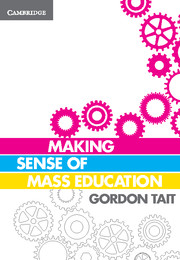Book contents
- Frontmatter
- Contents
- Acknowledgements
- INTRODUCTION
- PART 1 RE-ASSESSING THE THREE PILLARS: MODERN AND POSTMODERN SOCIOLOGIES OF EDUCATION
- CHAPTER 1 SOCIAL CLASS
- CHAPTER 2 GENDER
- CHAPTER 3 RACE/ETHNICITY
- PART 2 THE FOUNDATIONS OF AN ALTERNATIVE APPROACH: EDUCATION AND GOVERNANCE
- PART 3 CULTURAL CONTEXTS OF CONTEMPORARY EDUCATION
- PART 4 PHILOSOPHY AND MASS EDUCATION
- CONCLUSION
- References
- Index
CHAPTER 1 - SOCIAL CLASS
from PART 1 - RE-ASSESSING THE THREE PILLARS: MODERN AND POSTMODERN SOCIOLOGIES OF EDUCATION
- Frontmatter
- Contents
- Acknowledgements
- INTRODUCTION
- PART 1 RE-ASSESSING THE THREE PILLARS: MODERN AND POSTMODERN SOCIOLOGIES OF EDUCATION
- CHAPTER 1 SOCIAL CLASS
- CHAPTER 2 GENDER
- CHAPTER 3 RACE/ETHNICITY
- PART 2 THE FOUNDATIONS OF AN ALTERNATIVE APPROACH: EDUCATION AND GOVERNANCE
- PART 3 CULTURAL CONTEXTS OF CONTEMPORARY EDUCATION
- PART 4 PHILOSOPHY AND MASS EDUCATION
- CONCLUSION
- References
- Index
Summary
This chapter argues that understanding social class isn't a straightforward matter. First, it is a subject that many feel uncomfortable discussing, let alone applying to themselves or anyone else. Second, there is only tenuous agreement about exactly what it is, exactly how it organises the life opportunities of our citizens, and how best to study it.
In attempting to better understand the relationship between social class and education in Australia, this chapter will address three familiar myths. In doing so, it will trace important changes in the way that the social sciences have tried to explain this phenomenon. Most notably, these changes involve a shift away from a focus on economic and structural aspects of social class, to a greater emphasis on issues of cultural practice.
Myth #1 Australia is a society characterised by equality
It is often suggested that Australia isn't beset with the social or economic distinctions that characterise many other countries.
Success in Australia is deemed to be based upon merit. However, contrary to this belief, the evidence suggests that there is an inequitable distribution of wealth in Australia, one that is no different to other industrialised countries. Furthermore, this inequality extends to gaining access to well-resourced schools.
Myth #2 Schooling success is only about individual ability
Given we all sit the same exams, it seems perfectly appropriate to claim that education is a fair race, and that hence the winners deserve their victory.
Research into schooling success presents a more complex picture. The dominant model – that of Critical Theory – points to the vital role that schooling plays in the processes of social reproduction. According to this reasoning, wealth buys educational success, that success guarantees more wealth, which then buys the next generation’s educational success. Individual ability is only one small part of this cycle.
- Type
- Chapter
- Information
- Making Sense of Mass Education , pp. 11 - 31Publisher: Cambridge University PressPrint publication year: 2012



